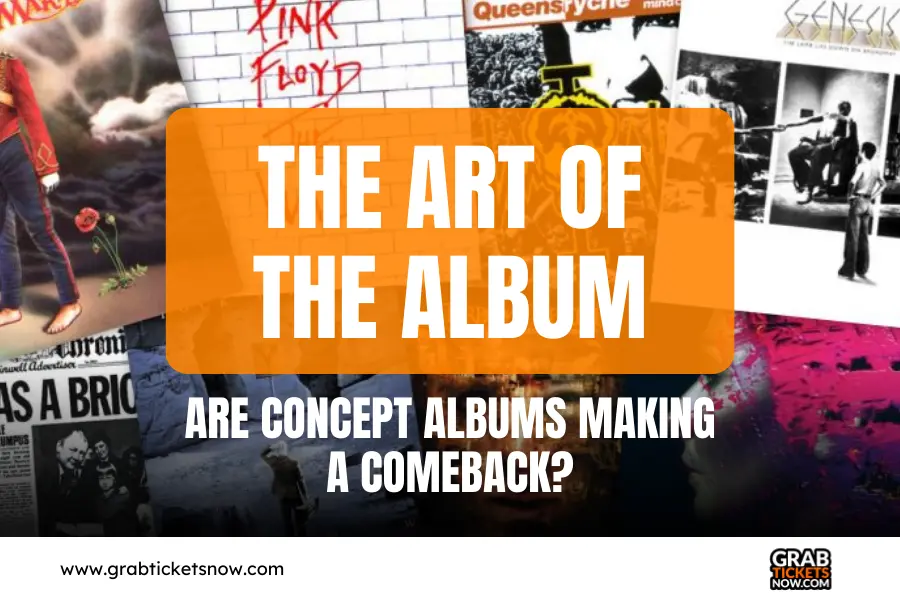
The Art of the Album: Are Concept Albums Making a Comeback?
Introduction: The Power of Musical Storytelling
In an era dominated by singles and playlists, a fascinating trend is emerging in the music industry: the resurgence of the concept album. These ambitious projects, which tell a cohesive story or explore a central theme across an entire album, are once again capturing the imagination of artists and listeners alike. In this blog, we’ll delve into the world of concept albums, exploring their history, their recent revival, and what this means for the future of music.
Whether you’re a long-time fan of concept albums or new to the idea, this exploration will enhance your appreciation for this unique art form. And if you’re inspired to experience concept albums live, don’t forget to check out upcoming concerts at GrabTicketsNow.com.
What is a Concept Album?
A concept album is a collection of songs that are thematically linked and, in many cases, tell a specific story. Unlike traditional albums, which may be a collection of unrelated songs, concept albums are designed to be listened to as a complete work, often in a specific order.
Key elements of concept albums:
- A central theme or narrative
- Cohesive musical and lyrical elements
- Often accompanied by elaborate artwork and packaging
For a deeper dive into the definition and history of concept albums, the AllMusic Guide to Concept Albums is an excellent resource.
The Golden Age of Concept Albums
The 1960s and 1970s are often considered the golden age of concept albums. This era saw the release of numerous iconic works that pushed the boundaries of what an album could be:
- The Beatles – “Sgt. Pepper’s Lonely Hearts Club Band” (1967)
- The Who – “Tommy” (1969)
- Pink Floyd – “The Wall” (1979)
These albums not only told compelling stories but also revolutionized album artwork and packaging, creating immersive experiences for listeners.
The Decline and Resurgence
The rise of MTV in the 1980s and the subsequent focus on singles and music videos led to a decline in concept albums. However, the format never completely disappeared, with artists like Prince (“Purple Rain”) and Queensrÿche (“Operation: Mindcrime”) carrying the torch.
In recent years, we’ve seen a resurgence of interest in concept albums. This revival can be attributed to several factors:
- A desire for deeper, more immersive musical experiences
- Nostalgia for the album format
- Artists seeking to differentiate themselves in a crowded market
Modern Concept Albums: A New Era
Today’s concept albums often blend traditional storytelling with modern themes and production techniques. Some notable recent examples include:
- Kendrick Lamar – “good kid, m.A.A.d city” (2012)
- Beyoncé – “Lemonade” (2016)
- The Weeknd – “After Hours” (2020)
These albums demonstrate that the concept album format can be adapted to any genre, from hip-hop to pop to R&B. To stay updated on the latest album releases and reviews, check out our music blog category.
The Role of Technology in Concept Album Creation
Advancements in technology have opened up new possibilities for concept album creation:
- Digital production tools allow for more complex soundscapes
- Visual albums (like Beyoncé’s “Lemonade”) integrate music with film
- Virtual reality experiences can create immersive album worlds
These technological innovations are helping artists push the boundaries of what a concept album can be, creating multi-sensory experiences for their audience.
The Impact of Streaming on Concept Albums
The rise of streaming platforms has had a complex impact on concept albums:
Challenges:
- Emphasis on individual tracks rather than complete albums
- Shorter attention spans of listeners
Opportunities:
- Ability to create “visual albums” on video streaming platforms
- Use of playlists to guide listeners through the album narrative
Despite these challenges, many artists are finding creative ways to encourage listeners to experience their albums as complete works. Platforms like Spotify have even introduced features like “Canvas” and “Storyline” to enhance the album listening experience.
Concept Albums in Live Performances
Many artists are bringing their concept albums to life through elaborate live performances. These shows often feature:
- Theatrical elements and storytelling
- Visual projections and elaborate stage designs
- Performance of the album in its entirety
These concerts offer fans a unique opportunity to experience the album’s narrative in a communal setting. If you’re interested in attending such performances, keep an eye on our upcoming events page for concept album tours.
The Future of Concept Albums
As we look to the future, several trends are shaping the evolution of concept albums:
- Interactive albums that allow listeners to influence the narrative
- Cross-media projects that span music, film, and literature
- AI-generated concept albums based on user input
While the format may change, the desire for immersive, narrative-driven musical experiences is likely to endure.
Conclusion: The Enduring Appeal of Musical Narratives
The resurgence of concept albums in the digital age demonstrates the enduring power of musical storytelling. In a world of singles and playlists, these ambitious projects offer listeners a chance to dive deep into an artist’s vision, experiencing music as a complete, cohesive work of art.
Whether you’re revisiting classic concept albums or discovering new ones, these works remind us of music’s power to transport, challenge, and inspire. As artists continue to push the boundaries of what an album can be, the future of concept albums looks brighter than ever.
Ready to experience the magic of a concept album live? Check out our upcoming concerts and secure your tickets now. Don’t forget to use our promo codes for the best deals!
For more insights into music trends and album reviews, be sure to follow our music blog category. The world of concept albums is always evolving, and we’re here to keep you informed every step of the way.
